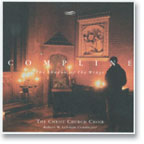
"The early Christian Church established a daily cycle of prayer called the Hours. The eight Hours marked the day from dawn to fading light. The earliest formal description of Compline is found in St. Benedict's Rule, written in the early seventh century. St. Benedict called the final Hour of the day Compline, from the Latin complere, to complete. He described in fewer than thirty words the form Compline would take for the next thousand years. He wanted the prayer kept simple: Psalm, hymn, chapter, blessing, and dismissal. "After Compline," wrote St. Benedict, "no one may speak."
"In the early sixteenth century, the Reformation swept Europe, and the Anglican Church broke with Rome. King Henry VIII dissolved all the monasteries, where for hundreds of years monks had measured their days according to the Hours. The first Anglican Book of Common Praveg published in 1549, collapsed the eight Hours into two: Matins in the morning, Evensong at sunset. Compline was subsumed into Evensong. It would not reappear as a separate office in the Anglican Church for another four hundred years.
"The night prayer of Compline is practical again now in a way unforeseen during the Reformation. At Christ Church in New Haven, people use it not as part of a daily cycle of prayer, not as one of the monastic Hours, but as the sole point of calm in a hectic week. Compline at Christ Church serves a new kind of worshipper. Through music that is centuries old, it draws in people of all beliefs, or of none, and it joins them to one another.
"Darkness and incense heavy silence greet those who enter Christ Church on Sunday nights. Candles offer the only light. Sheathed in colored glass, red, blue, green, they cluster at the foot of the shrine to the Virgin Mary; they drape the High Altar; seven lamps hang suspended in the sanctuary like the Pleiades. People in their street shoes walk slowly up the long center aisle; some genuflect, bending a knee and crossing themselves. Some simply stare. They slide into seats that seem to be the right distance from the light, from the altar, from the door, from whatever is about to happen. Shortly before ten o'clock, church bells begin to clang, distant and discordant. And then an unseen choir begins to sing..." - Kendra Mack
Includes: